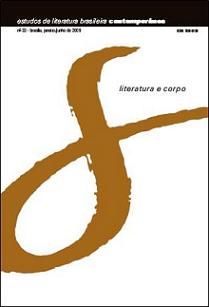O paraíso não tão bacana de André Sant’Anna
Abstract
Este ensaio examina a confluência entre a articulação de identidades coletivas e individuais e os paradigmas culturais difundidos pela globalização e a lógica do capitalismo tardio em O paraíso é bem bacana, de André Sant’Anna. Através de um discurso hubrístico, Sant’Anna se apropria dos parâmetros epistemológicos e materiais da globalização neoliberal que (re)criam práticas de marginalização social na época presente para, subsequentemente, indagá-los. Dentro do capitalismo tardio, o sujeito como ente privado e público interage sobretudo dentro de uma rede de intercâmbio material, transformando-se ele/a mesmo/a em mercadoria.
Downloads
References
PEREIRA, Carlos Alberto Messeder et al. “Introdução” a Linguagens da violência, em _______ (org.). Linguagens da violência. Rio de Janeiro: Rocco, 2000.
APPADURAI, Arjun. Fear of small numbers: an essay on the geography of anger. Durham and London: Duke UP, 2006.
_______. Modernity at large: cultural dimensions of globalization. Minneapolis: Univ. of Minnesota P, 1996.
BAUDRILLARD, Jean. The consumer society. myths and structures. Trans. by Chris Turner. New Delhi and London: Sage, 1998.
BAUMAN, Zygmunt. Postmodernity and its discontents. New York: NYU P, 1997.
_______. Liquid Modernity. Cambridge and Malden, MA: Polity, 2000.
_______. Wasted lives: Modernity and its outcasts. New York: Polity, 2004.
_______. Liquid fear. Cambridge: Polity Press, 2006.
_______. Consuming life. Cambridge and Malden, MA: Polity, 2007.
CANDIDO, Antonio. A educação pela noite e outros ensaios. São Paulo: Ática, 1987.
CONCHA-EASTMAN, Alberto. “Urban violence in Latin America and the Caribbean: dimensions, explanations, actions”, em ROTKER, Susana and GOLDMAN, Katherine (org.). Citizens of fear: urban violence in Latin America. New Brunswick: Rudgers UP, 2002. pp. 37-54.
DEBORD, Guy. The society of the spectacle. Trans. by Donald Nicholson-Smith. New York: Zone Books, 1995.
DIAS, Ângela Maria. “O paraíso é bem bacana: a última ‘teogonia à s avessas’ de André Sant’Anna”, XI Congresso Internacional da ABRALIC. São Paulo, 2008.
JAMESON, Frederic. Postmodernism, or, the cultural logic of late capitalism. Durham: Duke UP, 1991.
KOONINGS, Kees. “Shadows of violence and political transition in Brazil: from military rule to democratic governance”, em KOONINGS, Kees and KRUJIT, Dirk (org.). Societies of fear: the legacy of civil war, violence and terror in Latin America. London and New York: Zed Books, 1999.
PELLEGRINI, Tânia. “No fio da navalha: literatura e violência no Brasil de hoje”. Estudos de literatura brasileira contemporânea, nº 24, 2004, pp. 15-34.
ROOT, Deborah. Cannibal culture. art, appropriation, and the commodification of difference. Boulder: Westview P, 1996.
SANT'ANNA, André. O paraíso é bem bacana. São Paulo: Companhia das Letras, 2006.
SCHOLHAMMER, Karl Erik. “Breve mapeamento das relações entre violência e cultura no Brasil contemporâneo”. Estudos de literatura brasileira contemporânea, nº 29, 2007, pp. 27-54.
SOARES, Luiz Eduardo. “Uma interpretação do Brasil para contextualizar a violência”, em PEREIRA, Carlos Alberto Messeder et al. (org.). Linguagens da violência. Rio de Janeiro: Rocco, 2000.
VIDAL, Paloma. “O ventríloquo cínico: sobre O paraíso é bem bacana de André Sant’Anna”, em DEALTRY, Giovanna et al. (org.). Alguma prosa: ensaios sobre literatura brasileira contemporânea. Rio de Janeiro: 7Letras, 2007.
Downloads
Published
How to Cite
Issue
Section
License
Authors who publish in this journal agree to the following terms:
a) The authors maintain the copyright and grant the journal the right of first publication, the work being simultaneously licensed under the Creative Commons Attribution License-Non Commercial 4.0 which allows the sharing of the work with acknowledgment of the authorship of the work and publication this journal.
b) Authors are authorized to enter into additional contracts separately, for non-exclusive distribution of the version of the work published in this journal (eg publish in institutional repository or as a book chapter), with authorship recognition and publication in this journal.
c) Authors are allowed and encouraged to publish and distribute their work online (eg in institutional repositories or on their personal page) after the editorial process, as this can generate productive changes, as well as increase the impact and citation of published work (See The Effect of Free Access).
d) The authors of the approved works authorize the magazine to, after publication, transfer its content for reproduction in content crawlers, virtual libraries and the like.
e) The authors assume that the texts submitted to the publication are of their original creation, being fully responsible for their content in the event of possible opposition by third parties.


